Search
Search Results
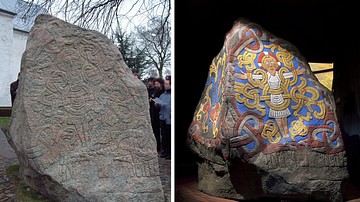
Article
Harald Bluetooth & the Conversion of Denmark
In Scandinavia, Christianity spread due to the support and encouragement of political rulers at the top of the society above all else. Conversion, defined here as the actions taken by kings or clerics to introduce the new religion, did not...

Article
Vikings: Jewelry, Weapons & Social Change at The VIKINGR Exhibition
In April 2019, The Museum of Cultural History in Oslo, Norway, opened its doors to the new exhibition VÍKINGR, containing rich treasures and unique archaeological finds from the Viking Age (c. 750-1050). The Viking Age is considered Norway's...

Article
Siege of Sevastopol in 1941-2
The siege of Sevastopol (Oct 41 to Jul 42) was an attack by Axis forces on the base of the USSR's Black Sea Fleet during Operation Barbarossa of the Second World War (1939-45). Sevastopol (aka Sebastopol) had one of the world's strongest...

Video
Gone Viking with Bill Arnott - the three-part Viking Travel Sagas!
Bill Arnott guides readers on this bestselling literary odyssey, following history’s most feared and misunderstood voyageurs - the Vikings! To “go viking” is to embark on an epic journey. For eight years Bill Arnott journeyed throughout...
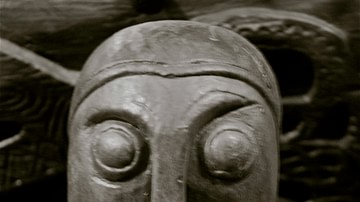
Definition
Vikings
The Vikings were originally diverse Scandinavian seafarers from Norway, Sweden, and Denmark (though other nationalities were later involved) whose raids and subsequent settlements significantly impacted the cultures of Europe and were felt...
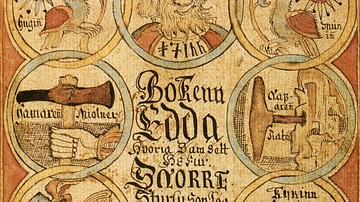
Definition
Edda
Edda is a term used to describe two Icelandic manuscripts that were copied down and compiled in the 13th century CE. Together they are the main sources of Norse mythology and skaldic poetry that relate the religion, cosmogony, and history...
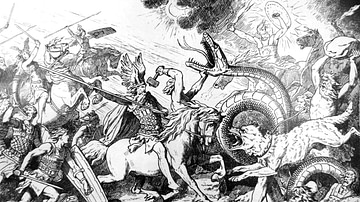
Image
Ragnarök
The wolf Fenrir broken loose from his chains and Thor fighting the Midgard serpent with his hammer Mjollnir (also Mjǫllnir, Mjölnir) at Ragnarök from Norse mythology, illustration by Johannes Gehrts from Walhall Germanische Götter und Heldensagen...
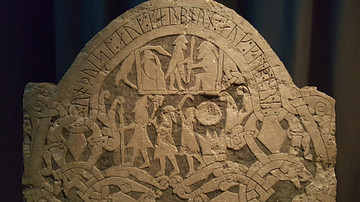
Image
Viking Rune Stone (Sanda, Sweden)
Top part of a rune stone found at Sanda, Gotland, Sweden, dating to the Viking Age, thought to depict Odin, Thor and Freyr. The runic inscription reads: 'Rodvisl and Farbjörn and Gunbjörn' (The Swedish History Museum/Historiska Museet, Stockholm...
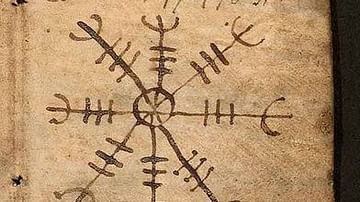
Image
The Helm of Awe
The Helm of Awe (Icelandic: Ægishjálmur), a magical symbol (stave) recorded in an Icelandic manuscript in the 1600s. The term is attested in the Old Norse poem Fáfnismál (1200s) in the context of the fight between the hero Sigurd and the...

Image
Gamla Uppsala, Royal Mounds
Burial mounds at Gamla Uppsala, Sweden. Legend has it that three Norse gods - Odin, Thor, and Freyr - were buried under each and the site where the Temple of Uppsala once stood was sacred to them. Excavations of the mounds and site in the...